Launched in 2016 and funded by conservative US gentiles and Jews, the Passages program aims to shape the next generation of Christian leaders and shore up support for Jewish State
By RENEE GHERT-ZAND, TOI Today, 3:02 am1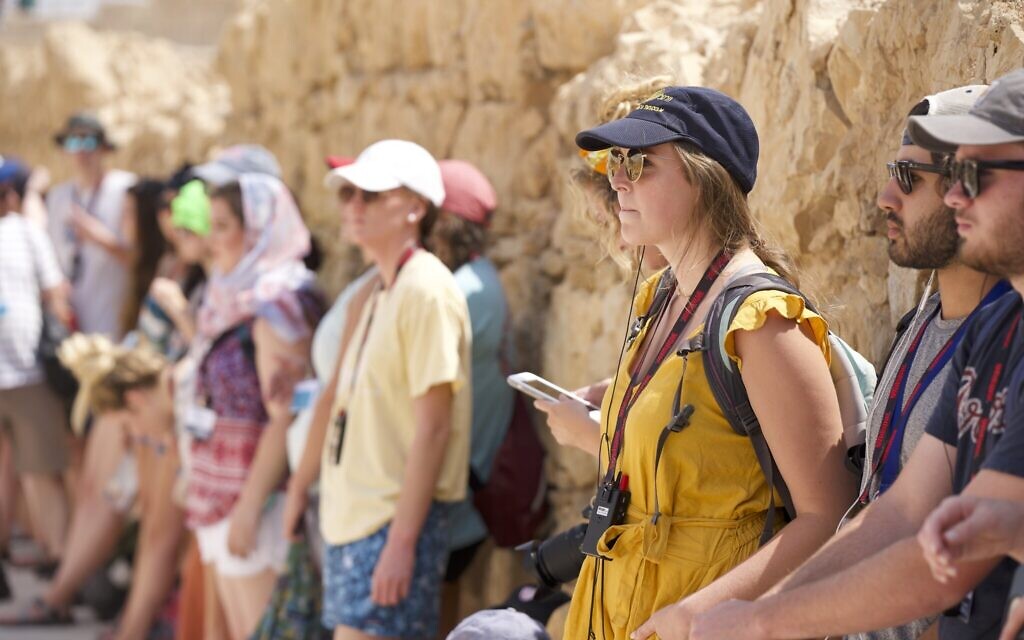
-
-
American Christian students on a Passages trip to Israel. (Courtesy of Passages)
-
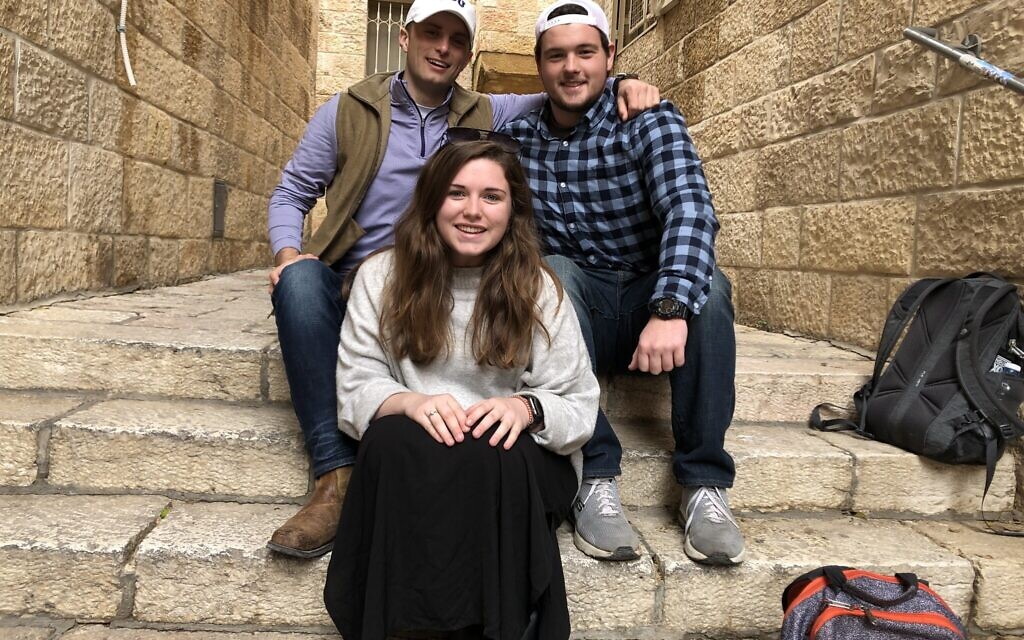 Left to right: Cage Sawyers, Kate Mullen, and Seth Bray take a break in Jerusalem’s Old City on a Passages trip, January 5, 2020. (Renee Ghert-Zand/TOI)
Left to right: Cage Sawyers, Kate Mullen, and Seth Bray take a break in Jerusalem’s Old City on a Passages trip, January 5, 2020. (Renee Ghert-Zand/TOI)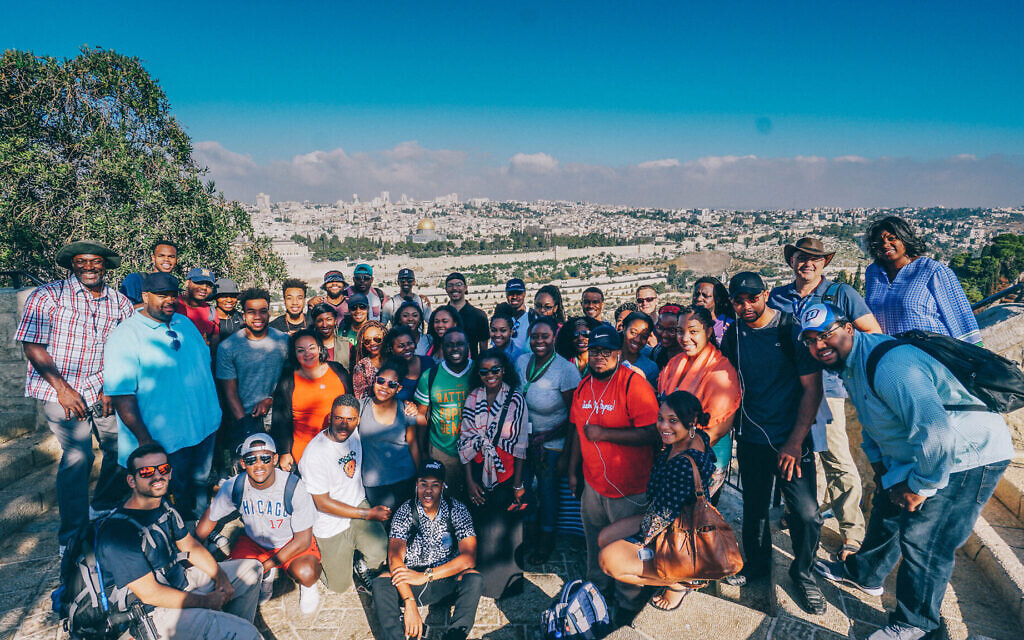 American Christian students on a Passages trip to Israel. (Courtesy of Passages)
American Christian students on a Passages trip to Israel. (Courtesy of Passages) American Christian students on a Passages trip to Israel. (Courtesy of Passages)
American Christian students on a Passages trip to Israel. (Courtesy of Passages) American Christian students look out over Jerusalem on a Passages trip to Israel. (Courtesy of Passages)
American Christian students look out over Jerusalem on a Passages trip to Israel. (Courtesy of Passages)
Five hundred college students streamed into a large party venue in southern Jerusalem with a panoramic view of the Old City. They noshed on mini shwarma sandwiches and cotton candy, and danced with abandon to Israeli pop music — some creating a mosh pit near the DJ’s stage at the front of the hall.
But they weren’t participating in Birthright Israel, the mega project that since it was founded in 1999 has brought upwards of 750,000 young Jews to the country. These young Americans were in Israel this month with Passages, an organization that brings practicing Christian college and graduate students from all over the United States to the Holy Land for a 10-day trip to connect with the biblical roots of their faith, and with modern Israel.
In operation since January 2016, Passages is expected to bring 10,000 students to Israel by the end of 2020. The students are accepted through a selective application process. This winter break alone, Passages brought more than 1,000 students to the Jewish state on the highly subsidized trip.
Passages was launched by Rivka Kidron and Robert Nicholson in 2016 with funding from politically conservative Jewish hedge fund owner Paul E. Singer, and Steve Green, the evangelical Christian president of Hobby Lobby and founder of the Museum of the Bible. According to Passages’s leadership, it is now also funded by a variety of Jewish, Protestant, and Catholic donors who wish to remain anonymous. The program claims to be politically non-partisan and to focus on cultural affinity with Israel.

Co-founder Kidron previously served as an advisor to Prime Minister Benjamin Netanyahu on Diaspora affairs and the Christian world. Nicholson is executive director of the Philos Project, an organization that strives to promote Christian engagement with the Middle East and its cultures. (Singer is the major financial backer of the Philos Project.)
According to Passages executive director Scott Phillips, the program is not for evangelical Christians only. “We are ecumenical in our approach and accept students from all [Christian] denominations and backgrounds. One of the goals of our program is to create an ecumenical dialogue between Christians of many denominations,” he said.
“Passages offers a separate track designed specifically for Catholic participants,” Phillips added.

Similar to Birthright mega-events, the party in early January was attended by former Israeli ambassador to the US Michael Oren and current US ambassador to Israel David Friedman. It was a special celebration to mark the beginning of the organization’s fifth year and its rapid growth since its founding.
Kidron told the gathered students that Passages was created to address the fact that Christians coming to Israel were not engaging with the people living here, and that young Christians were not coming to Israel at all.
“Passages is about creating a new shared story [for Christians and Jews],” Kidron said. “It’s about engaging the next generation of Christian leaders.”
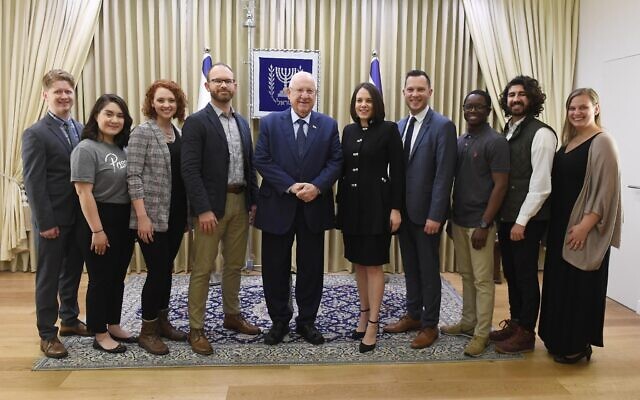
“Passages is meant to ignite your faith and introduce you to the [Holy] Land. You will never see your faith in the same way again,” Nicholson told the gathered students.
Real modern life in biblical Israel
Darion Ouliguian is a senior at UCLA who attends a non-denominational Protestant church and participates in interfaith and pro-Israel activities on campus. Ouliguian told The Times of Israel that he appreciated the program’s dual emphasis on the biblical Land of Israel and the everyday life of Israelis, including the ever-present geopolitical conflicts.
“Seeing the sites solidifies my faith. When I read the Bible, it’s no longer in black and white. It’s in color,” said Ouliguian, who came to Israel with Passages in 2018 and returned this winter as a Passages fellow (group leader).
“I really like how Passages combines the political and the religious experience. It ties it together eloquently,” he added.
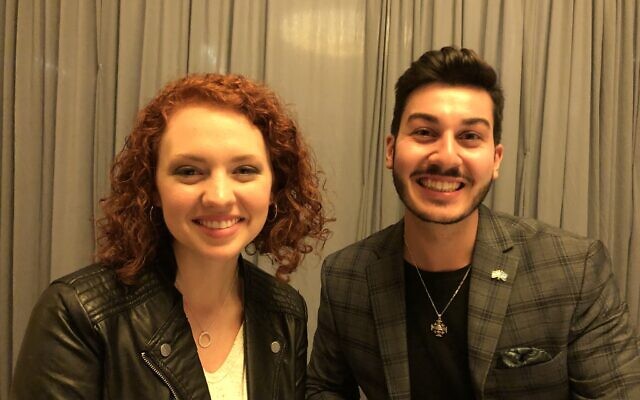
As on other pilgrimage trips, the students visit historical sites relevant to both the Hebrew Bible and the New Testament. They also tour iconic national institutions such as the Knesset and the Yad Vashem Holocaust museum.
To gain perspective on life in Israel and on the security issues the country faces, participants visit citizens living on the southern border with Gaza, get a briefing at Israel’s border with Syria, and hear from a panel of IDF soldiers about their experiences. They also join families in Jerusalem for a traditional Shabbat dinner.
“I was impressed with the blessing of the children at Shabbat dinner. It is so cool to honor the kids and highlight that they have a purpose in the Jewish culture. In my Baptist church, the young people are given the message from the adults that they need to just wait in the wings until it is their time,” Cage Saywers, a junior at Texas Christian University, told The Times of Israel on a lunch break in Jerusalem’s Old City.
“And I really liked it when the husband sang the prayer praising the wife,” said Kate Mullen, a junior at Georgia Southern University, referring to “A Woman of Valor,” or verses from Proverbs 31.
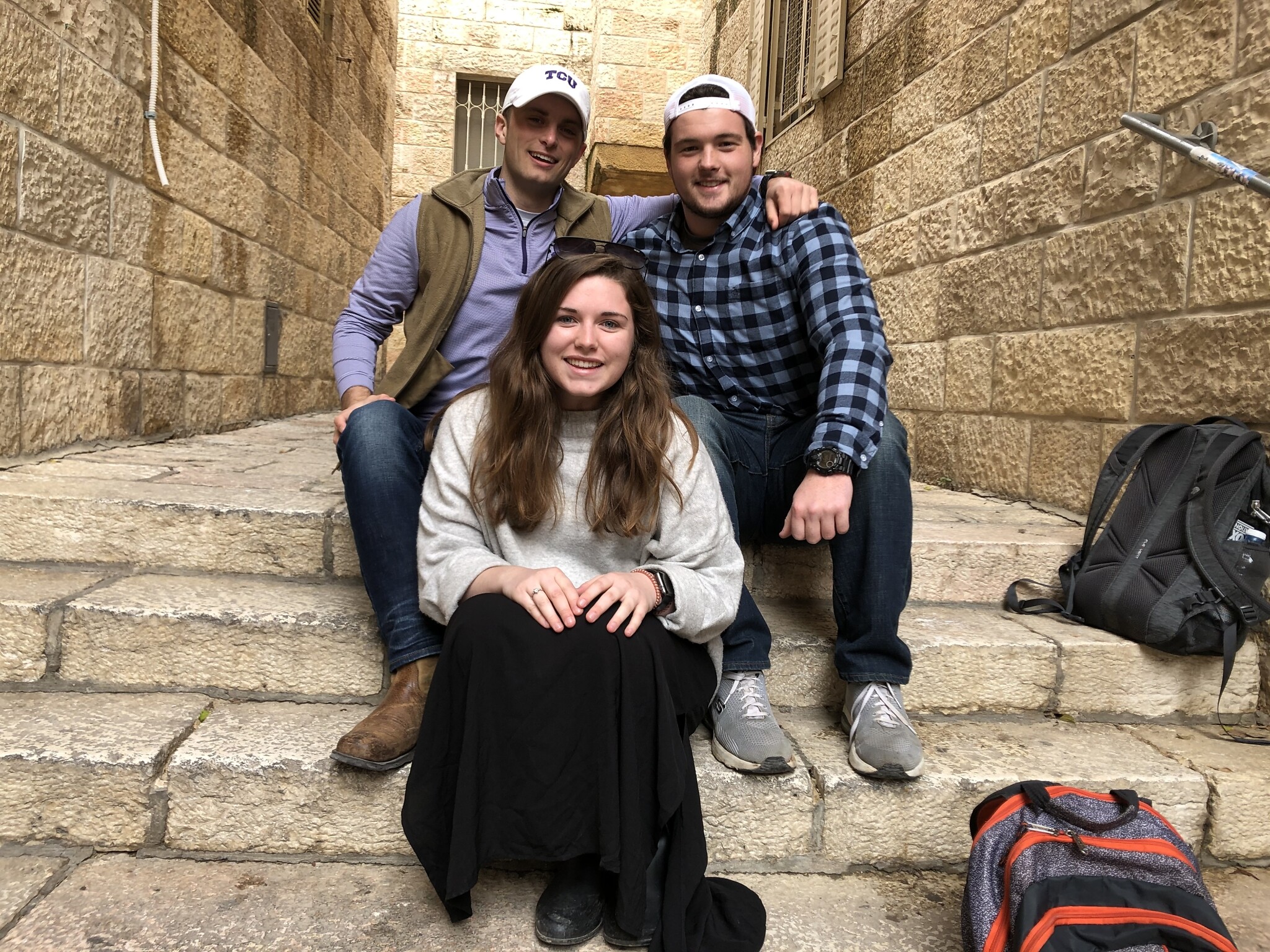
“In the [American] South, a woman’s place is generally in the home, and she doesn’t always get the respect she deserves. It was nice to see how Jewish men appreciate their wives,” Mullen said.
A variety of (Zionist) opinions
According to Phillips, Passages groups go over the Green Line to visit Jewish settlers in Alfei Menashe and Palestinians in Bethlehem.
Participants hear authentic first-person perspectives from Jewish, Christian, and Muslim Israelis, and Christian and Muslim Palestinians
“Participants hear authentic first-person perspectives from Jewish, Christian, and Muslim Israelis, and Christian and Muslim Palestinians. We seek to offer a diverse array of speakers who approach modern geopolitical issues in Israel and the Middle East from a variety of perspectives,” Phillips said.
Among the speakers who have addressed Passages groups are Israeli Aramaic Maronite Christian entrepreneur and captain in the IDF paratrooper reserves Shadi Khalloul Risho, and Rami Nazzal, a Palestinian from East Jerusalem who is a journalist and the founder of Beyond Border Tours. The students have also met with Shalom Hartman Institute senior fellow Dr. Tal Becker, Christian-Jewish relations expert Dr. Faydra Shapiro, and Israeli Arab journalist and filmmaker Khaled Abu Toameh.
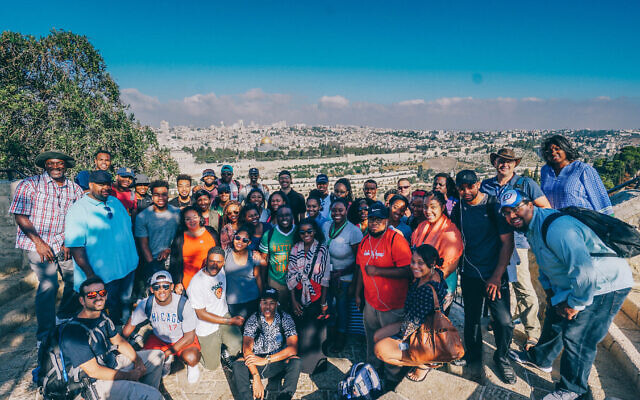
At the same time, the organization is clear about its pro-Israel stance, stating on its website that “Passages is transparent about its beliefs. In particular, Passages believes Israel is a force for good in the region and in the world. That being said, we do not claim that Israel is perfect… We believe Passages participants are smart, good, and have the ability to identify truth and we therefore consider this an educational journey…”
With the program’s emphasis on building bridges between Jews and Christians through visiting Israel, participants come away more strongly identifying with Israelis than with Palestinians.
Mattanah DeWitt, a 21-year-old recent graduate of Union University in Jackson, Tennessee, has been to Israel four times since first coming with Passages in 2017. Now a Passages staff member, she spent time on a previous trip volunteering in Jish, a northern Israeli town with a large population of Maronite Catholic and Melkite Greek Catholic Christians.

“I came to Israel with Passages expecting to connect to the place, but I ended up connecting more to the people. I really admire their resilience and how they are thriving. I am really invested in knowing and advocating for people here,” DeWitt said.
When asked which people she meant, DeWitt answered that it was specifically the Jews. “It is my responsibility and honor to stand with Jews,” she said.
It is my responsibility and honor to stand with Jews
DeWitt also shared that she has learned from her experiences with Passages to be more sensitive in how she expresses her faith to others. “I listen before speaking now. It’s humbling,” she said.
Here to listen, not preach
Seth Bray, a Southern Baptist freshman at Hannibal-LaGrange University in Missouri echoed this idea. “Passages made it clear to us that we are not here to evangelize, but rather to learn,” he said.
All participants are required to do pre-trip preparatory reading, and to engage with an alumni engagement program once they have returned home. They must complete at least three follow-up activities. Among the many options are a leadership course, connecting with their local Jewish community for a Shabbat dinner, and writing and essay or article.
“As Christians, we can be doing so much for Israel. We should protect and build up Christian-Jewish relations. I plan to be an ambassador for Israel when I get home,” Mullen said.
DeWitt said that Christians should be at the forefront of the fight against rising anti-Semitism, which has increased in the US as in other parts of the world in recent years.
“Visiting Yad Vashem was eye-opening. Being in Israel gave me greater awareness of anti-Semitism and the motivation to fight it,” DeWitt said.
Being in Israel gave me greater awareness of anti-Semitism and the motivation to fight it
Sawyers, who grew up in the small town of Van Alstyne, Texas, not knowing any Jews, plans to be a voice for Israel. A political conservative, he plans to run for public office in his home state within five years and take a staunchly supportive stance toward the Jewish state.
“We are brothers and sisters,” Sawyers said of Christians and Jews. “The US should be 100 percent behind Israel.”



Leave a Reply
You must be logged in to post a comment.